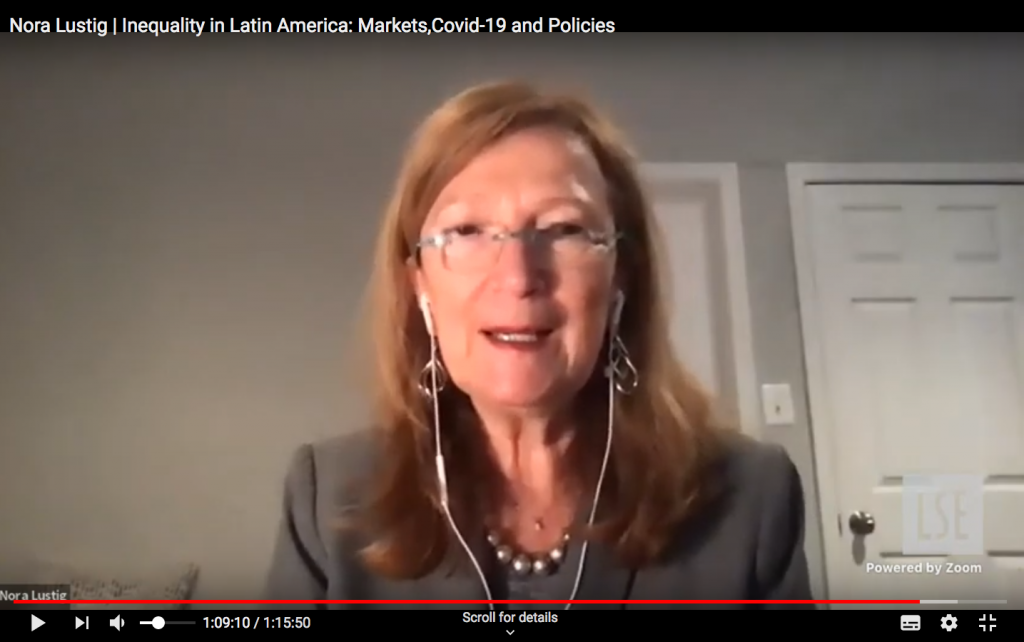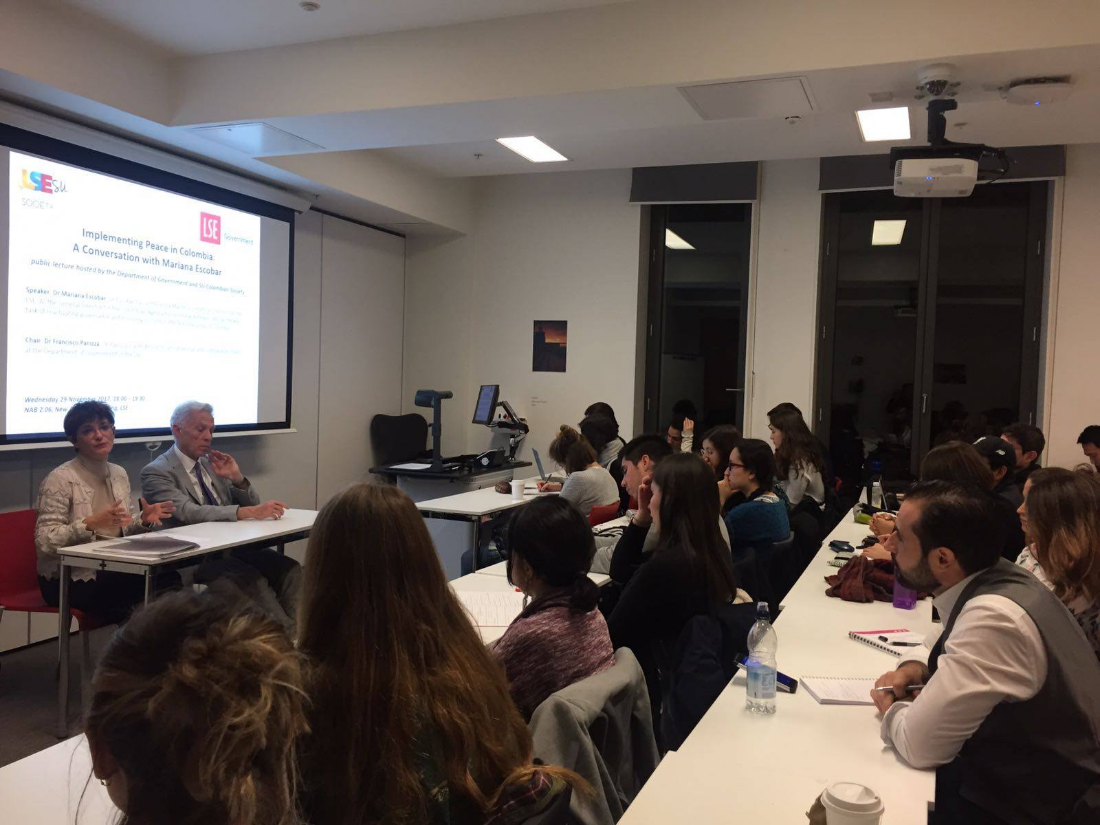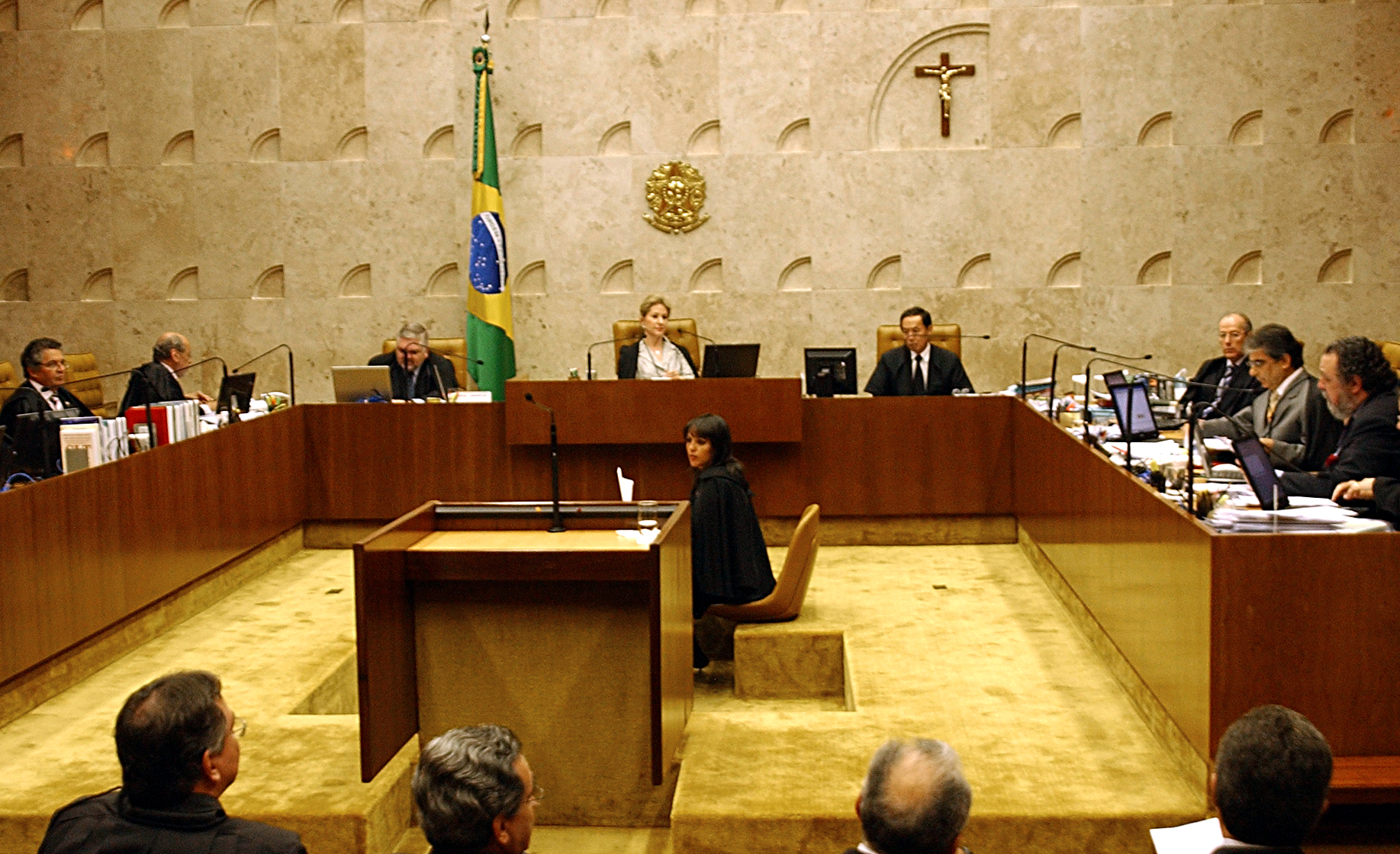On Friday 27 November, Professor Nora Lustig gave an online lecture, ‘Inequality in Latin America: Markets, Covid-19 and Policies’ as part of the Cutting Edge Issues in Development lecture series. Nora Lustig is Samuel Z. Stone Professor of Latin American Economics and the founding Director of the Commitment to Equity Institute (CEQ) at Tulane University. She is also a Nonresident Senior Fellow at the Brookings Institution, the Center for Global Development and the Inter-American Dialogue. Read what Development Management MSc students Ana Carolina Muñoz, Juan Javier Hernandez and Laura Hülsemann took away from the lecture below.
You can watch the guest lecture back on YouTube.

Inequality in Latin America has declined considerably in the last two decades, however, the shock of COVID-19 is likely to offset this optimistic (though recently weak) trend. In an engaging lecture, Dr. Nora Lustig addressed the serious effects the pandemic might have on regional inequality and poverty, pointing at an urgent need to consider expanded social protection and secure education for the poorest.
Inequality in the region decreased dramatically between 2000 and 2018 (almost 6 Gini points). Lustig’s findings identify two main determinants: access to education and expansion of public transfers. The composition of the labour force transformed into a more skilled one, and differences between the top and the bottom incomes narrowed as a result of greater access to education in the region. As well, public transfers became more abundant and progressive. Conditional cash transfer programs, such as Bolsa Familía in Brazil and Progresa in Mexico are related to positive human development outcomes and a significant reduction of inequality in household income per capita.
COVID-19 impact on inequality
Latin America is being severely hit by the pandemic. Brazil, Mexico, Argentina and Colombia are among the countries with more infections and number of deaths; in addition, the IMF predicts a fall of 8.1% regional GDP. In this scenario, inequality and poverty are very likely to worsen.
Social assistance programs would have a relevant mitigating effect, for instance, safety nets in Brazil and Argentina might offset the increase in inequality; while in Mexico, where there is no response of this kind, the number of new poor is expected to grow. Temporary impacts on education and health may considerably affect the human capital of poor children in the long-term. Despite the fact that most countries provided distance learning through digital platforms and telecommunications, poor children will be likely to have lower school achievements, which would translate into increased future wage inequality.
The main takeaway from this lecture is that, even though social programs could mitigate short-term income losses, they might not have a significant effect on educational losses, meaning not only that the income gap is likely to widen in the future, but the human development of a generation will be permanently affected. Thus, the policy response should go beyond social assistance and attempt to secure access to education for disadvantaged children during the pandemic if an important increase in inequality is to be countered in the long-run.
Ana Carolina Muñoz
_______________
We Latin Americans have a natural tendency to look with scepticism at the evidence of development in our region. In everyday conversations we always emphasise that the gap between rich and poor is ever widening and that the fruit of the work of the middle and popular classes is captured by the economic and political elite in our countries. It can be said that since colonial times there is a prejudice regarding the progress we make as a society. For this reason, seeing the figures on inequality from Professor Nora Lustig was a pleasant surprise that debunks the myths that we have created as Latinos.
The presentation addressed three elements about the reality of LATAM: i) Evolution and determinants of inequity 1990-2017, ii) Political unrest in this context and iii) COVID-19’s effect on inequality and poverty. For this review I am going to concentrate on the first part, mainly because of the importance it has for rethinking the real possibilities of how LATAM could become a more just and equitable region.
Professor Lustig shared with us the results on the Gini index for the region in three periods. In the first, between 1992 and 2002, we see a LATAM with different results regarding the reduction of inequalities; up to that point everything coincides with the historical and cultural script. However, the big surprise is the second period 2002-2013, when absolutely all countries reduced inequality to what could be called “The won decade – Década ganada.” Finally, for the period 2013-2017, inequality is still reducing but at a slower rate than the previous period of analysis. What are the conditions that led the region to obtain these results?
The explanation was undoubtedly much more satisfactory. Inequity would have decreased mainly due to two factors: i) Access to education generated better income for a new generation of workers and ii) Governments established effective social transfer policies. We can all relate these mechanisms to one of our classes on Development and the results are not a big surprise. What is interesting is to see how, at the same time, practically an entire region is advancing on the same path and widely exceeds the other regions of the world.
My main reflection on this topic coincides with what Professor Lustig told us. It must be considered that during that period, LATAM was mostly led by leftist governments, a group of Presidents with very similar political agendas and principles. The coordination of political discourses at the regional level is an important factor when it comes to understanding the trends that modify the realities of societies. In LATAM we lived it between the 80s and 90s with the liberalisation processes and now again in this “Década ganada”. To face the post-COVID-19 crisis, will we see a similar response in the region or will each country have its own formula? It is still a difficult question. The truth is that, in a certain way, the electoral trends of the next years can give us an answer.
Juan Javier Hernandez
_______________
Nora Lustig, professor of Latin American Economic in the Department of Economics at Tulane University, and author of the World Development Report 2000/1 “Attacking Poverty” took a closer look at the developments of inequality in Latin America.
Dr Lustig examined how Latin America entered its “Golden Age” from 2002-2013, as the commodity boom caused progress in many countries which translated into a decline in inequality. Such positive improvements are attributable to the expansion of access to education. The reduction of labour income inequality is due to the decrease of the wage gap between highly and poorly educated people, which ultimately changed the composition of the labour force. Secondly, government transfers as well as private transfers through remittances are strong factors in the reduction of poverty and inequality.
However, the end of the commodity boom has affected groups of society very differently. Dr Lustig suggests that the progress for those at the top continued even after the end of the commodity boom. Contrastingly, the improvements for those at the bottom declined or came to a halt, causing increasing frustrations for the disadvantaged parts of society. Such diverging effects may explain why we observe increasing public unrest and protests in Latin America, despite the fact that household-level data indicates a decline of inequality in Latin America.
Paradoxically, one may observe a decline in relative inequality while at the same time absolute inequality may be continuously rising. Indeed, while commonly used inequality measures such as the Gini coefficient only capture relative income, general household data also does not capture what is happening at the top level. When incorporating capital incomes by measuring income inequality based on tax data, the positive effect of inequality disappears, unravelling the question about the extent of relative and absolute poverty changes in Latin America.
The underlying mechanism may be that the absolute difference between the people at the bottom and the people at the top is rising. Dr Lustig suggests that such trends are likely to be even stronger when using corrected data rather than household data. Therefore, to answer the question about the evolution of Latin America’s inequality is a tough task.
Yet, one must not be overly pessimistic, as Dr Lustig also points out that social assistance programs such as Bolsa Familia in Brazil have had a positive effect on the trajectories for poor people in the region. In her analysis, she suggests that leftist governments in the region have been more successful than right-wing governments in reducing inequality and increasing household income per capita through increasing minimum wages and expanding social spending. While recent Covid-19 events come at a large health and economic costs for Latin Americans, Dr Lustig finds that governmental rescue policies may mitigate the risks of the most disadvantaged groups. For example, children of low-educated parents are likely to suffer most severely from the lockdown, hence why she advises Latin American governments to react immediately in order to prevent a generation from being left behind.
Laura Hülsemann
This Friday’s guest lecture will be with Clare Short, who will be joining us from London to give a lecture, ‘Reflecting on the demise of DfID’. LSE staff and students can sign up for the lecture here. External audiences can join the lecture via YouTube.
The views expressed in this post are those of the author and in no way reflect those of the International Development LSE blog or the London School of Economics and Political Science.





